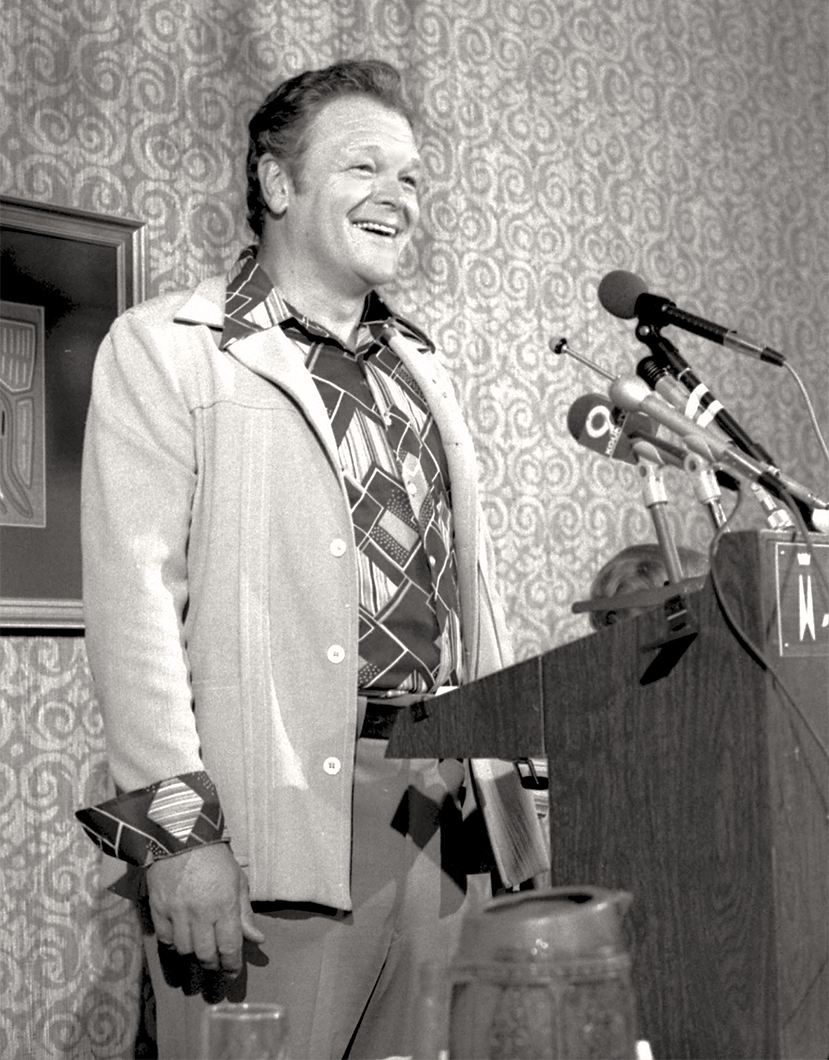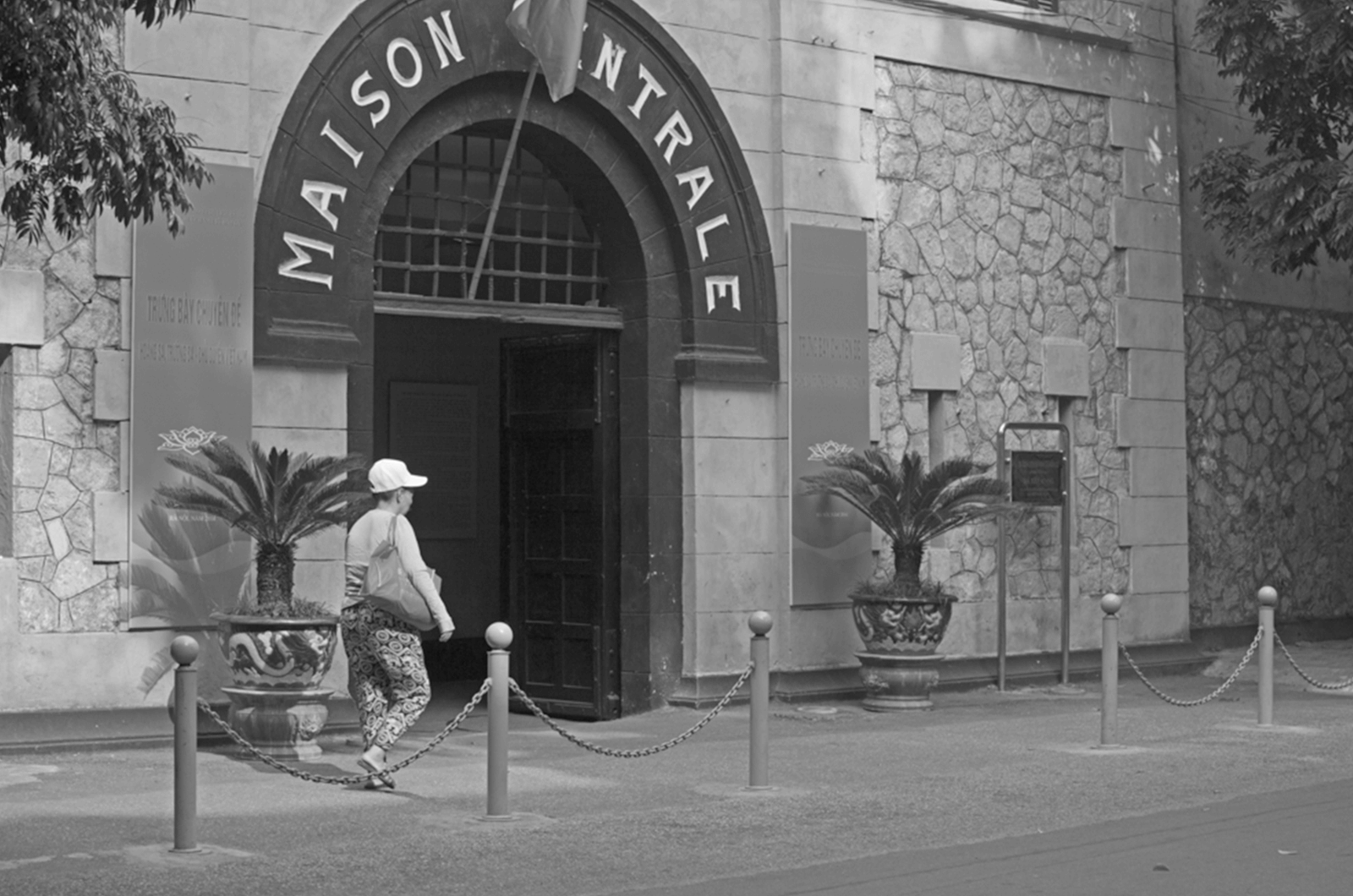 The late Laird Guttersen, who helped organize the Hanoi Hilton Toastmasters during the Vietnam War, speaks at a Tucson, Arizona, hotel in 1976. Guttersen eventually became a longtime member of a Toastmasters club in Tucson.
The late Laird Guttersen, who helped organize the Hanoi Hilton Toastmasters during the Vietnam War, speaks at a Tucson, Arizona, hotel in 1976. Guttersen eventually became a longtime member of a Toastmasters club in Tucson.Ten men dressed in blackened underwear and drenched in sweat took turns giving speeches. They weren’t merely members of Toastmasters. They were also U.S. prisoners of war in a North Vietnamese prison camp. It was the late ’60s. Many of them were fresh from months in solitary confinement.
“Comments are kept to a minimum in solitary,” cracks Laird Guttersen, a retired colonel in the Air Force, who lived through five years as a prisoner of war (POW). Just 18 when he joined the U.S. Army Air Corps, he was 42 when a Chinese Mig-21 fighter jet fired a heat-seeking missile and shot down his plane.
Guttersen and a friend surreptitiously organized Toastmasters activities in a communal cell within the Hoa Lo prison—or, as it was sarcastically called by the POWs there, the “Hanoi Hilton.” Guttersen’s group called themselves the Hanoi Hilton Toastmasters club. (After the war, the club was granted a charter membership by Toastmasters International.) The activities were aimed at helping the men rebuild their dignity. They spoke to feel themselves alive, to activate the elegance and nobility of the human spirit under impossible circumstances.
They used bamboo strips to design pens. Diarrhea pills and cigarette ashes to make ink. Toilet paper to write up the lesson plans and list of officers. When the guards became suspicious and rationed out smaller and smaller portions of toilet paper, they made paper out of a bread and water paste.
“One time after an interrogation, the guards stripped me down and found three bottles of ink, half a dozen pens and pencils,” says Guttersen. “Bits and pieces of anything loose I could steal. Because we didn’t have anything, it was important to be a kleptomaniac.”
The prisoners of war spoke to feel themselves alive, to activate the elegance and nobility of the human spirit under impossible circumstances.
Keeping Time
The men created a time-keeping pendulum out of string and stone. Unfortunately, the swing of the pendulum frequently hypnotized the timekeeper. “It was a thankless job,” quips Guttersen, who first discovered Toastmasters while working as an Air Force recruiter in New Orleans, Louisiana.
In a prison raid one day, the North Vietnamese seized the sheets of paper listing the club officers’ names, dragged the officers out, and tortured them.
“Toastmasters today often have a hard time finding officers for their clubs. I say, “You think you had a hard time finding officers. You should have seen us trying to find officers after five were beaten up.”
Yet they did.
Unlike their lives in the States, though, they didn’t have to juggle meetings in between frantic schedules, jobs and love lives. Instead, they met secretly in between sessions of the “rope trick,” a torture devised—at the very least—to dislocate shoulders. Screaming through the eyeballs was a more common form of expression than language.
“By forgiving Big Ug, there’s no way he could destroy me.”
— Laird GuttersenDuring one particularly despairing session of the rope trick, Guttersen’s nose stopped inches away from the blood- and mud-smeared wall when he saw the words, “Keep the faith, baby,” scratched into it in tiny letters.
A meeting of the Hanoi Hilton Toastmasters was much like suddenly feeling the impact of those four words in the midst of terror. Heartfelt communion through the spoken word was a delicacy, a medium of deep healing, far more satisfying than tapping and sweeping out codes.
And it brought them closer to their primary mission—to learn how to express themselves clearly so they would be able to translate their nearly untranslatable experiences to the general public and their loved ones when they finally returned home.
 Maison Centrale—the infamous “Hanoi Hilton” prison in the Vietnam War—is now a museum.
Maison Centrale—the infamous “Hanoi Hilton” prison in the Vietnam War—is now a museum.Guttersen recalls, “One speaker could barely put a sentence together. He stumbled and stammered, but by the time he did 10 speeches, he was lucid, fluent, and coherent, if not brilliant.”
Lucid, fluent, coherent, and free. These Toastmasters didn’t stop speaking once they were released during the Paris Peace Accords. Much to the chagrin of a three-starred general, Guttersen used his powerful voice to speak out for those left behind, becoming the godfather of the POW/MIA movement. Today he notes, “I have the sense that if I’m going to get up and give a speech, somebody needs to hear what I have to say.”
The Power of Forgiveness
When he talks about his five years in a prison camp, Guttersen speaks not to sensationalize the torture in an “I Fought 1,000 Snakes in Hanoi” tabloid fashion, but to show the power of forgiveness. After endless months knotted in a constant web of anger, fear, and hatred, Guttersen knew that if he were to survive, he had to learn how to feel even the smallest spark of love again. Daily, he began summoning the image of his young daughter throwing her arms around his neck and saying, “I love you, daddy.” That vision alone flooded him with waves of unconditional love.
Eventually, he began superimposing this love symbol on the guards, especially “Big Ug,” who’d been particularly savage with him. Twice a day for three years, he practiced this vision of love until he actually began to feel sorry for his captors. “By forgiving Big Ug, there’s no way he could destroy me. I couldn’t hurt myself or my loved ones over him.”
Guttersen has shared this tale over and over again. A man walked up to him out of the blue one day and said, “You don’t know this, but I heard you speak for an hour two years ago. I had decided to commit suicide that night, and your talk changed my mind.”
As Guttersen says, “With your increased skills of communication in Toastmasters, you know you can influence people. You just never know whether you’ll influence one person or a thousand people. You may change the course of history without ever knowing you’ve done it.”
At least 10 men can testify to that.
Editor’s Note: This is a condensed version of an article that originally ran in the October 1999 issue of the Toastmaster magazine.



 Previous
Previous
 HANOI HILTON POSTSCRIPT
HANOI HILTON POSTSCRIPT
 Previous Article
Previous Article